C++头文件大全
C语言常见头文件 计算机二级必备
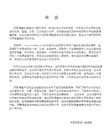
#include <list> //STL 线性列表容器
#include <map> //STL 映射容器
#include <iomanip>
#include <ios> //基本输入/输出支持
#include <iosfwd> //输入/输出系统使用的前置声明
#include <vector> //STL 动态数组容器
#include <cwchar>
#include <cwctype>
using namespace std;
//////////////////////////////////////////////////////////////////////////
你就可以自定义一个头文件,然后把这些头文件放到自定义的头文件中,然后在那个类开头包含自定义的头文件就行了,不需要再写以上头文件,这样就使代码显得简练易懂.
c++里面的类,函数,变量都有声明和定义的区别
在用到一个类或函数或变量之前,必须进行声明,但可以在之后定义。
比如
#include <cstdlib>
#include <cstring>
#include <ctime>
#include <deque> //STL 双端队列容器
#include <exception> //异常处理类
#include <fstream>
#include <functional> //STL 定义运算函数(代替运算符)
c语言头函数

C语言中的头文件是包含在源代码文件中以便在编译时进行预处理的文件。
头文件通常包含函数、宏定义、结构体声明和其他重要的代码片段,以便在多个源文件中共享和重用。
一些常见的C语言头文件包括:
1. `<stdio.h>`:包含输入输出函数,如`printf` 和`scanf`。
2. `<stdlib.h>`:包含内存分配和释放函数,如`malloc` 和`free`,以及其他常用的函数。
3. `<string.h>`:包含字符串操作函数,如`strcpy`、`strlen` 和`strcmp`。
4. `<math.h>`:包含数学函数,如三角函数、指数函数等。
5. `<time.h>`:包含时间和日期相关的函数,如`time` 和`strftime`。
6. `<ctype.h>`:包含字符分类函数,如`isalpha` 和`isdigit`。
7. `<stdbool.h>`:定义了`bool` 类型和`true`、`false` 常量,用于布尔值。
8. `<stddef.h>`:定义了`NULL` 宏和一些与指针相关的类型。
这只是一小部分常用的C语言头文件,实际上还有很多其他头文件,每个头文件都提供了特定的功能。
通过包含适当的头文件,你可
以在C程序中使用相应的函数和定义。
c语言的头文件大全

有趣的是,你很难找到一项关于标准库函数的最标准的信息。对于每一个函数,都需要有一个(在极少数情况下需要两个)保证能将该函数的原型提供给你的头文件(在调用任何一个函数时,都应该包含其原型,见8.2)。有趣的是什么呢?这个头文件可能并不是真正包含该函数原型的文件,在有些(非常糟糕!)情况下,甚至由编译程序手册推荐的头文件都不一定正确。对于宏定义,typedef和全局变量,同样会发生这种情况。
fclose stdio. h
feof stdio.h
ferror stdio.h
fflush stdio. h
fgetc stdio.h
c标准库中还缺少很多函数,例如投有图形函数,甚至没有全屏幕文本操作函数,signal机制也相当弱(见12.10),并且根本没有对多任务或使用常规内存以外的内存提供支持。尽管C标准库存在上述缺陷,但它毕竟为所有的程序都提供了一套基本功能,不管这些程序是运行在多任务、多窗口的环境下,还是运行在简单的终端上,或者是运行在一台昂贵的烤面包机上。
fgetpos stdio. h
fgets
stdio.h
FILE stdio. h
FILENAME-MAX stdio. h
floor math. h
fmod math. h
fopen stdio. h
FOPEN_MAX stdio. h
fpos_t stdio. h
cos math. h
cosh math. h
ctime time. h
c语言的头文件大全
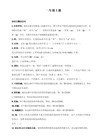
feof stdio.h
ferror stdio.h
fflush stdio. h
fgetc stdio.h
C标准库中所缺的函数可以从其它途径获得,例如编译程序开发商和第三方的函数库都会提供一些函数,这些函数都是事实上的标准函数。然而,标准库中的函数已经为程序设计提供了一个非常坚实的基础
12.1. 为什么应该使用标准库函数而不要自己编写函数?
标准库函数有三点好处:准确性、高效性和可移植性。
fwrite stdio. h
getc stdio.h
getchar stdio. h
getenv stdlib. h
gets stdio.h
abort stdlib. h
abs stdlib. h
acos math. h
asctime time. h
asin math. h
islower ctype. h
isprint ctype. h
ispunct ctype. h
isspace ctype. h
isupper ctype. h
fmod math. h
fopen stdio. h
FOPEN_MAX stdio. h
fpos_t stdio. h
fpnntf stdio. h
因此,你不用去寻找真正定义一个函数的头文件并使用这个文件,而应该使用那个被假定为定义了该函数的头文件,这样做是肯定可行的。
有几个名字在多个头文件中被定义:NULL,size_t和wchar_t。如果你需要其中一个名字的定义,可以使用任意一个定义了该名字的头文件((stddef.h>是一个较好的选择,它不仅小,而且包含了常用的宏定义和类型定义)。
C语言头文件大全

1 头文件ctype.h函数列表<>函数类别函数用途详细说明字符测试是否字母和数字isalnum是否字母isalpha是否控制字符iscntrl是否数字isdigit是否可显示字符(除空格外)isgraph是否可显示字符(包括空格)isprint是否既不是空格,又不是字母和数字的可显示字符ispunct是否空格isspace是否大写字母isupper是否16进制数字(0-9,A-F)字符isxdigit字符大小写转换函数转换为大写字母toupper转换为小写字母tolower地区化本类别的函数用于处理不同国家的语言差异。
2 头文件local.h函数列表函数类别函数用途详细说明地区控制地区设置setlocale数字格式约定查询国家的货币、日期、时间等的格式转换localeconv数学函数本分类给出了各种数学计算函数,必须提醒的是ANSI C标准中的数据格式并不符合IEEE754标准,一些C语言编译器却遵循IEEE754(例如frinklin C51) .3 头文件math.h函数列表函数类别函数用途详细说明错误条件处理定义域错误(函数的输入参数值不在规定的范围内)值域错误(函数的返回值不在规定的范围内)三角函数反余弦acos反正弦asin反正切atan反正切2 atan2余弦cos正弦sin正切tan双曲函数双曲余弦cosh双曲正弦sinh双曲正切tanh指数和对数指数函数exp指数分解函数frexp乘积指数函数fdexp自然对数log以10为底的对数log10浮点数分解函数modf幂函数幂函数pow平方根函数sqrt整数截断,绝对值和求余数函数求下限接近整数ceil绝对值fabs求上限接近整数floor求余数fmod本分类函数用于实现在不同底函数之间直接跳转代码。
4 头文件setjmp.h io.h函数列表函数类别函数用途详细说明保存调用环境setjmp恢复调用环境longjmp信号处理该分类函数用于处理那些在程序执行过程中发生例外的情况。
c语言头文件大全.doc-吕滔博客
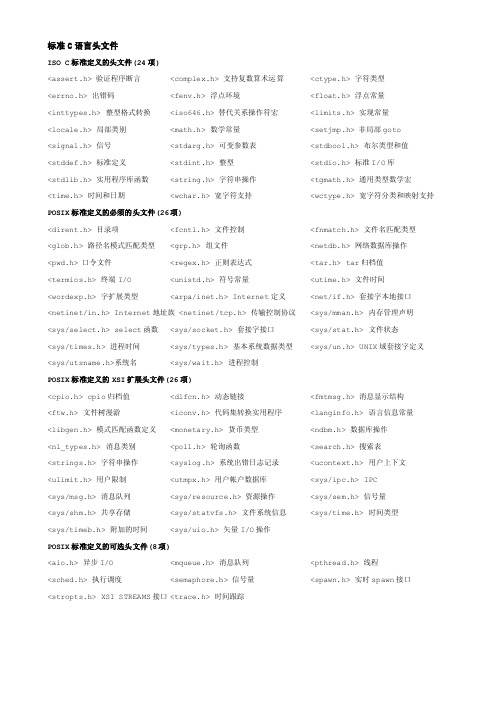
标准C语言头文件ISO C标准定义的头文件(24项)<assert.h> 验证程序断言<complex.h> 支持复数算术运算<ctype.h> 字符类型<errno.h> 出错码<fenv.h> 浮点环境<float.h> 浮点常量<inttypes.h> 整型格式转换<iso646.h> 替代关系操作符宏<limits.h> 实现常量<locale.h> 局部类别<math.h> 数学常量<setjmp.h> 非局部goto<signal.h> 信号<stdarg.h> 可变参数表<stdbool.h> 布尔类型和值<stddef.h> 标准定义<stdint.h> 整型<stdio.h> 标准I/O库<stdlib.h> 实用程序库函数<string.h> 字符串操作<tgmath.h> 通用类型数学宏<time.h> 时间和日期<wchar.h> 宽字符支持<wctype.h> 宽字符分类和映射支持POSIX标准定义的必须的头文件(26项)<dirent.h> 目录项<fcntl.h> 文件控制<fnmatch.h> 文件名匹配类型<glob.h> 路径名模式匹配类型<grp.h> 组文件<netdb.h> 网络数据库操作<pwd.h> 口令文件<regex.h> 正则表达式<tar.h> tar归档值<termios.h> 终端I/O <unistd.h> 符号常量<utime.h> 文件时间<wordexp.h> 字扩展类型<arpa/inet.h> Internet定义<net/if.h> 套接字本地接口<netinet/in.h> Internet地址族 <netinet/tcp.h> 传输控制协议<sys/mman.h> 内存管理声明<sys/select.h> select函数<sys/socket.h> 套接字接口<sys/stat.h> 文件状态<sys/times.h> 进程时间<sys/types.h> 基本系统数据类型<sys/un.h> UNIX域套接字定义<sys/utsname.h>系统名<sys/wait.h> 进程控制POSIX标准定义的XSI扩展头文件(26项)<cpio.h> cpio归档值<dlfcn.h> 动态链接<fmtmsg.h> 消息显示结构<ftw.h> 文件树漫游<iconv.h> 代码集转换实用程序<langinfo.h> 语言信息常量<libgen.h> 模式匹配函数定义<monetary.h> 货币类型<ndbm.h> 数据库操作<nl_types.h> 消息类别<poll.h> 轮询函数<search.h> 搜索表<strings.h> 字符串操作<syslog.h> 系统出错日志记录<ucontext.h> 用户上下文<ulimit.h> 用户限制<utmpx.h> 用户帐户数据库<sys/ipc.h> IPC<sys/msg.h> 消息队列<sys/resource.h> 资源操作<sys/sem.h> 信号量<sys/shm.h> 共享存储<sys/statvfs.h> 文件系统信息<sys/time.h> 时间类型<sys/timeb.h> 附加的时间<sys/uio.h> 矢量I/O操作POSIX标准定义的可选头文件(8项)<aio.h> 异步I/O <mqueue.h> 消息队列<pthread.h> 线程<sched.h> 执行调度<semaphore.h> 信号量<spawn.h> 实时spawn接口<stropts.h> XSI STREAMS接口<trace.h> 时间跟踪标准 C++ 语言头文件(54个其中16个用于构建STL,3个为附加非必须)<algorithm>STL通用算法<bitset> STL位集容器<cassert> 用于在程序运行时执行断言<cctype> 字符处理<cerrno> 错误码<cfloat> 用于测试浮点类型属性<ciso646> ISO646变体字符集<climits> 测试整数类型属性<clocale> 本地化函数<cmath> 数学函数<complex>复数类<csetjmp> 执行非内部的goto语句<csignal> 信号<cstdarg> 访问参数数量变化的函数<cstddef> 用于定义实用的类型和宏<cstdio> 输入/输出<cstdlib> 杂项函数及内存分配<cstring> 字符串<ctime> 时间<cwchar> 宽字符处理及输入/输出<cwctype> 宽字符分类<deque> STL双端队列容器<exception> 异常处理类<fstream> 文件流<functional> STL函数对象<iomanip> 参数化输入/输出<ios>基本输入/输出支持<iosfwd> 输入/输出前置声明<iostream> 数据流输入/输出<istream> 基本输入流<iterator> 遍历序列的类<limits> 各种数据类型最值常量<list>STL线性列表容器<locale> 国际化支持<map> STL映射容器<memory> 专用内存分配器<new> 基本内存分配和释放<numeric> 通用的数字操作<ostream> 基本输出流<queue> STL 队列容器<set> STL 集合容器<sstream> 基于字符串的流<stack> STL 堆栈容器<stdexcept> 标准异常类<streambuf> iostream 的缓冲区类<string> 字符串类<strstream> 非内存字符序列的流类<typeinfo> 运行时类型标识<utility> STL 通用模板类<valarray> 支持值数组的类和模版类<vector> STL 动态数组容器标准C++附加的头文件(3个)非必须<hash_map> <hash_set> <slist>The Standard C++ library consists of 51 required headers.This implementation also includesthree additional headers,<hash_map>,<hash_set>,and <slist>,not required by the C++ Standard,for a total of 54 headers.Of these 54 headers,16 constitute the Standard Template Library,or STL.These are indicated below with the notation<algorithm> -- (STL) for defining numerous templates that implement useful algorithms<bitset> -- for defining a template class that administers sets of bits<complex> -- for defining a template class that supports complex arithmetic<deque> -- (STL) for defining a template class that implements a deque container<exception> -- for defining several functions that control exception handling<fstream> -- for defining several iostreams template classes that manipulate exteral files<functional>-- (STL) for defining several templates that help construct predicates for the templates defined in <algorithm> and <numeric><hash_map> -- (STL) for defining template classes that implement hashed associative containersthat map keys to values<hash_set> -- (STL) for defining template classes that implement hashed associative containers<iomanip> -- for declaring several iostreams manipulators that take an argument<ios> -- for defining the template class that serves as the base for many iostreams classes<iosfwd> -- for declaring several iostreams template classes before they are necessarilydefined<iostream> -- for declaring the iostreams objects that manipulate the standard streams<istream> -- for defining the template class that performs extractions<iterator> -- (STL) for defining several templates that help define and manipulate iterators<limits> -- for testing numeric type properties<list>-- (STL) for defining a template class that implements a doubly linked list container<locale> -- for defining several classes and templates that controllocale-specific behavior, as in the iostreams classes<map>-- (STL) for defining template classes that implement associative containers thatmap keys to values<memory>-- (STL) for defining several templates that allocate and free storage for variouscontainer classes<new> -- for declaring several functions that allocate and free storage<numeric>-- (STL) for defining several templates that implement useful numeric functions<ostream> -- for defining the template class that performs insertions<queue> -- (STL) for defining a template class that implements a queue container<set>-- (STL) for defining template classes that implement associative containers<slist>-- (STL) for defining a template class that implements a singly linked list container<sstream> -- for defining several iostreams template classes that manipulate string containers<stack> -- (STL) for defining a template class that implements a stack container<stdexcept> -- for defining several classes useful for reporting exceptions<streambuf> -- for defining template classes that buffer iostreams operations<string> -- for defining a template class that implements a string container<strstream> -- for defining several iostreams classes that manipulate in-memory character sequences<typeinfo> -- for defining class type_info, the result of the typeid operator<utility>-- (STL) for defining several templates of general utility<vector>-- (STL) for defining a template class that implements a vector container新的C标准库<cassert> -- for enforcing assertions when functions execute<cctype> -- for classifying characters<cerrno> -- for testing error codes reported by library functions<cfloat> -- for testing floating-point type properties<ciso646> -- for programming in ISO 646 variant character sets<climits> -- for testing integer type properties<clocale> -- for adapting to different cultural conventions<cmath> -- for computing common mathematical functions<csetjmp> -- for executing nonlocal goto statements<csignal> -- for controlling various exceptional conditions<cstdarg> -- for accessing a varying number of arguments<cstddef> -- for defining several useful types and macros<cstdio> -- for performing input and output<cstdlib> -- for performing a variety of operations<cstring> -- for manipulating several kinds of strings<ctime> -- for converting between various time and date formats<cwchar> -- for manipulating wide streams and several kinds of strings<cwctype> -- for classifying wide characters旧的C标准库<assert.h> -- for enforcing assertions when functions execute<ctype.h> -- for classifying characters<errno.h> -- for testing error codes reported by library functions<float.h> -- for testing floating-point type properties<iso646.h> -- for programming in ISO 646 variant character sets<limits.h> -- for testing integer type properties<locale.h> -- for adapting to different cultural conventions<math.h> -- for computing common mathematical functions<setjmp.h> -- for executing nonlocal goto statements<signal.h> -- for controlling various exceptional conditions<stdarg.h> -- for accessing a varying number of arguments<stddef.h> -- for defining several useful types and macros<stdio.h> -- for performing input and output<stdlib.h> -- for performing a variety of operations<string.h> -- for manipulating several kinds of strings<time.h> -- for converting between various time and date formats<wchar.h> -- for manipulating wide streams and several kinds of strings<wctype.h> -- for classifying wide charactersFinally, in this implementation, the Standard C++ library also includes several headers for compatibility with traditional C++ libraries:<fstream.h> -- for defining several iostreams template classes that manipulate exteral files <iomanip.h> -- for declaring several iostreams manipulators that take an argument<iostream.h> -- for declaring the iostreams objects that manipulate the standard streams <new.h> -- for declaring several functions that allocate and free storage财务部工作总结、分析及计划报告范文[财务部工作总结、分析及计划报告范文]务部工作总结、分析及计划报告范文2009-12-10 10:25读者上传【大中小】【打印】【我要纠错】在上级财务部门的业务指导下,以年初支公司提出的工作思路为指导,以提高企业效益为核心,以增强企业综合竞争力为目标,以成本治理和资金治理为重点,全面落实预算治理,强基础,抓规范,实现了全年业务制度规范化,经营治理科学化,企业效益最大化,有力地推动了支公司财务治理水平的进一步提高,充分发挥了财务治理在企业治理中的核心作用,财务部工作总结、分析及计划报告范文。
C语言头文件使用大全
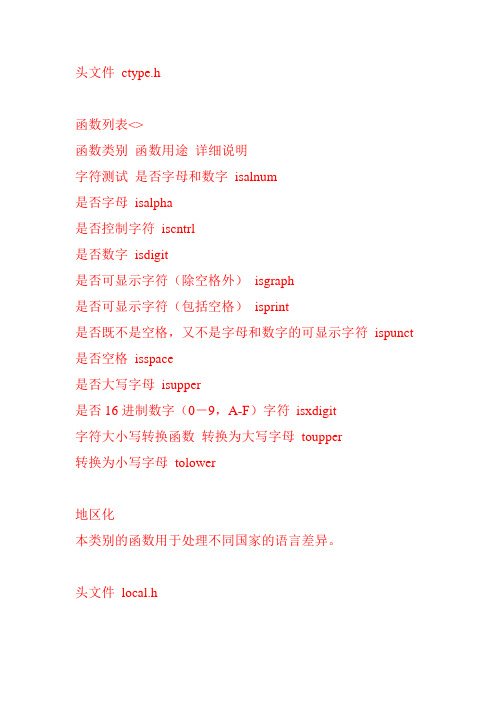
头文件ctype.h函数列表<>函数类别函数用途详细说明字符测试是否字母和数字isalnum是否字母isalpha是否控制字符iscntrl是否数字isdigit是否可显示字符(除空格外)isgraph是否可显示字符(包括空格)isprint是否既不是空格,又不是字母和数字的可显示字符ispunct 是否空格isspace是否大写字母isupper是否16进制数字(0-9,A-F)字符isxdigit字符大小写转换函数转换为大写字母toupper转换为小写字母tolower地区化本类别的函数用于处理不同国家的语言差异。
头文件local.h函数列表函数类别函数用途详细说明地区控制地区设置setlocale数字格式约定查询国家的货币、日期、时间等的格式转换localeconv数学函数本分类给出了各种数学计算函数,必须提醒的是ANSI C标准中的数据格式并不符合IEEE754标准,一些C语言编译器却遵循IEEE754(例如frinklin C51)头文件math.h函数列表函数类别函数用途详细说明错误条件处理定义域错误(函数的输入参数值不在规定的范围内)值域错误(函数的返回值不在规定的范围内)三角函数反余弦acos反正弦asin反正切atan反正切2 atan2余弦cos正弦sin正切tan双曲函数双曲余弦cosh双曲正弦sinh双曲正切tanh指数和对数指数函数exp指数分解函数frexp乘积指数函数fdexp自然对数log以10为底的对数log10浮点数分解函数modf幂函数幂函数pow平方根函数sqrt整数截断,绝对值和求余数函数求下限接近整数ceil绝对值fabs求上限接近整数floor求余数fmod本分类函数用于实现在不同底函数之间直接跳转代码。
头文件setjmp.h io.h函数列表函数类别函数用途详细说明保存调用环境setjmp恢复调用环境longjmp信号处理该分类函数用于处理那些在程序执行过程中发生例外的情况。
C 头文件大全
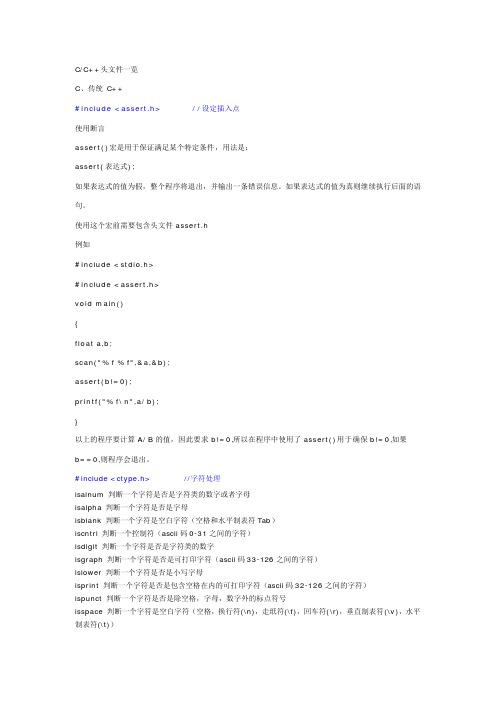
if(isblank('\t')) // Tab printf("It's True"); // 显示 It's True
if(isblank('\n')) // 换行 printf("It's True"); // 显示 ''
if(isspace('\n')) // 换行 printf("It's True"); // 显示 It's True
if(isspace('\r')) // 回车 printf("It's True"); // 显示 It's True
return 0; } iscntrl()函数的作用是判断一个控制符(ascii 码 0-31 之间的字符): #include <stdio.h> #include <ctype.h> int main(void) {
int fgetc(FILE *stream); int getc(FILE *stream);/* 与 fgetc 相同但是可以用宏实现该函数 */ 写一个字符到一个流
if(isalnum('a')) printf("It's True"); // 显示 It's True
if(isalnum(4)) printf("It's True"); // 显示 ''
- 1、下载文档前请自行甄别文档内容的完整性,平台不提供额外的编辑、内容补充、找答案等附加服务。
- 2、"仅部分预览"的文档,不可在线预览部分如存在完整性等问题,可反馈申请退款(可完整预览的文档不适用该条件!)。
- 3、如文档侵犯您的权益,请联系客服反馈,我们会尽快为您处理(人工客服工作时间:9:00-18:30)。
C/C++头文件一览C、传统C++#include <assert.h>//设定插入点使用断言assert()宏是用于保证满足某个特定条件,用法是:assert(表达式);如果表达式的值为假,整个程序将退出,并输出一条错误信息。
如果表达式的值为真则继续执行后面的语句。
使用这个宏前需要包含头文件assert.h例如#include <stdio.h>#include <assert.h>void main(){float a,b;scan("%f %f",&a,&b);assert(b!=0);printf("%f\n",a/b);}以上的程序要计算A/B的值,因此要求b!=0,所以在程序中使用了assert()用于确保b!=0,如果b==0,则程序会退出。
#include <ctype.h>//字符处理isalnum 判断一个字符是否是字符类的数字或者字母isalpha 判断一个字符是否是字母isblank 判断一个字符是空白字符(空格和水平制表符Tab)iscntrl 判断一个控制符(ascii码0-31之间的字符)isdigit 判断一个字符是否是字符类的数字isgraph 判断一个字符是否是可打印字符(ascii码33-126之间的字符)islower 判断一个字符是否是小写字母isprint 判断一个字符是否是包含空格在内的可打印字符(ascii码32-126之间的字符)ispunct 判断一个字符是否是除空格,字母,数字外的标点符号isspace 判断一个字符是空白字符(空格,换行符(\n),走纸符(\f),回车符(\r),垂直制表符(\v),水平制表符(\t))isupper 判断一个字符是否是大写字母isxdigit 判断一个字符是否是一个十六进制的数字tolower 将大些字符转换为小写toupper 将小写字符转换为大写isalnum()函数的作用是判断一个字符是否是字符类的数字或者字母:#include <stdio.h>#include <ctype.h>int main(void){if(isalnum('a'))printf("It's True"); // 显示It's Trueif(isalnum(4))printf("It's True"); // 显示''if(isalnum('4'))printf("It's True"); // 显示It's Truereturn 0;}isalpha()函数的作用是判断一个字符是否是字母:#include <stdio.h>#include <ctype.h>int main(void){if(isalpha('a'))printf("It's True"); // 显示It's Trueif(isalpha(4))printf("It's True"); // 显示''if(isalpha('4'))printf("It's True"); // 显示''return 0;}isblank()函数的作用是判断一个字符是空白字符(空格和水平制表符Tab),isspace()函数和isblank()函数类似,但是还包含空格,换行符(\n),走纸符(\f),回车符(\r),垂直制表符(\v),水平制表符(\t):#include <stdio.h>#include <ctype.h>int main(void){if(isblank(' ')) // 空格printf("It's True"); // 显示It's Trueif(isblank('\t')) // Tabprintf("It's True"); // 显示It's Trueif(isblank('\n')) // 换行printf("It's True"); // 显示''if(isblank('\r')) // 回车printf("It's True"); // 显示''if(isspace(' ')) // 空格printf("It's True"); // 显示It's Trueif(isspace('\t')) // Tabprintf("It's True"); // 显示It's Trueif(isspace('\n')) // 换行printf("It's True"); // 显示It's Trueif(isspace('\r')) // 回车printf("It's True"); // 显示It's Truereturn 0;}iscntrl()函数的作用是判断一个控制符(ascii码0-31之间的字符):#include <stdio.h>#include <ctype.h>int main(void){if(isblank(' ')) // 空格printf("It's True"); // 显示''if(isblank('\t')) // Tabprintf("It's True"); // 显示It's Trueif(isblank('\n')) // 换行printf("It's True"); // 显示It's Trueif(isblank('\r')) // 回车printf("It's True"); // 显示It's Truereturn 0;}isdigit()函数的作用是判断一个字符是否是字符类的数字:#include <stdio.h>#include <ctype.h>int main(void){if(isdigit('4'))printf("It's True"); // 显示It's Trueif(isdigit(4))printf("It's True"); // 显示''if(isdigit('a'))printf("It's True"); // 显示''return 0;}isgraph()函数的作用是判断一个字符是否是可打印字符(ascii码33-126之间的字符),isprint()函数功能和isgraph()函数类似,区别是isprint()函数包含空格在内(ascii码32-126之间的字符):#include <stdio.h>#include <ctype.h>int main(void){if(isgraph('a'))printf("It's True"); // 显示It's Trueif(isgraph('.'))printf("It's True"); // 显示It's Trueif(isgraph(' ')) // 空格printf("It's True"); // 显示''if(isprint('a'))printf("It's True"); // 显示It's Trueif(isprint('.'))printf("It's True"); // 显示It's Trueif(isprint(' ')) // 空格printf("It's True"); // 显示It's Truereturn 0;}islower()函数的作用是判断一个字符是否是小写字母,isupper()函数的作用是判断一个字符是否是大写字母:#include <stdio.h>#include <ctype.h>int main(void){if(islower('a'))printf("It's True"); // 显示It's Trueif(islower('A'))printf("It's True"); // 显示''if(isupper('a'))printf("It's True"); // 显示''if(isupper('A'))printf("It's True"); // 显示It's Truereturn 0;}ispunct()函数的作用是判断一个字符是否是除空格,字母,数字外的标点符号:#include <stdio.h>#include <ctype.h>int main(void){if(ispunct('a'))printf("It's True"); // 显示''if(ispunct('.'))printf("It's True"); // 显示It's Trueif(ispunct('<'))printf("It's True"); // 显示It's Truereturn 0;}isxdigit()函数的作用是判断一个字符是否是一个十六进制的数字:#include <stdio.h>#include <ctype.h>int main(void){if(isxdigit('4'))printf("It's True"); // 显示It's Trueif(isxdigit('xE'))printf("It's True"); // 显示It's Trueif(isxdigit('xF'))printf("It's True"); // 显示''return 0;}tolower()函数的作用是将大些字符转换为小写,toupper()函数的作用是将小写字符转换为大写:#include <stdio.h>#include <ctype.h>int main(void){char n,m,i,j;n = tolower('A');m = tolower('a');i = toupper('a');j = toupper('.');printf("%c %c %c %c", n, m, i, j); // 显示a a A .return 0;#include <errno.h>//定义错误码#include <float.h>//浮点数处理#include <fstream.h>//文件输入/输出#include <iomanip.h>//参数化输入/输出#include <iostream.h>//数据流输入/输出#include <limits.h>//定义各种数据类型最值常量#include <locale.h>//定义本地化函数#include <math.h>//定义数学函数#include <stdio.h>//定义输入/输出函数<stdio.h>下面的类型,宏,函数都是分类的其他:size_t sizeof返回的值NULL 空指针文件:FILE 文件的类型fpos_t 文件中指针的位置EOF 文件末尾<0FILENAME_MAX 文件名最大值>0FOPEN_MAX 同时打开文件的最大值>8SEEK_SET 文件头SEEK_CUR 文件当前位置SEEK_END 文件末尾打开文件FILE *fopen(const char *filename,const char *mode);更改当前流相关的文件FILE *freopen(const char *filename,const char *mode,FILE *stream); 关闭文件int fclose(FILE *stream);清除流中的错误标志或文件末尾标志void clearerr(FILE *stream);测试流上的文件末尾标志int feof(FILE *stream);测试流上的错误标志int ferror(FILE *stream);将一个字符放回到流中int ungetc(int c, FILE *stream);从流中读一个字符int fgetc(FILE *stream);int getc(FILE *stream);/* 与fgetc相同但是可以用宏实现该函数*/写一个字符到一个流int fputc(int c, FILE *stream);int putc(int c, FILE *stream);从流中获取一个字符串char *fgets(char *s, int n, FILE *stream);写一个字符串到一个流int fputs(const char *s, FILE *stream);打印一个格式化数据到一个流int fprintf(FILE *stream,const char *format, ...);使用一个参量列表指针格式化到流的数据int vfprintf(FILE *stream,const char *format, va_list ap);从一个流中读取格式化数据int fscanf(FILE *stream, const char *format, ...);从一个流中读数据size_t fread(char *buffer,size_t size,size_t count,FILE *stream);写数据到一个流int fwrite(const char *buffer, size_t size, size_t count,FILE *stream);获取流的文件位置指示符int fgetpos(FILE *stream, fpos_t *pos);设置流位置指示符int fsetpos(FILE *stream, const fpos_t *pos);移动文件指针到一个指定的位置int fseek(FILE *stream, long offset, int origin);获得文件指针相对于文件头的偏移量long ftell(FILE *stream);重新定位一个文件指针到文件开头void rewind(FILE *steam);删除一个文件int remove(const char *path);更改一个文件或目录int rename(const char *oldname, const char *newname);缓冲区:_IOFBF_IOLBF_IONBF 缓冲区类型BUFSIZE 缓冲区尺寸>=256刷新一个流并清空与流相关的缓冲区的内容int fflush(FILE *stream);控制流的缓冲区,已经被setvbuf代替void setbuf(FILE *stream, char *buffer);控制流的缓冲区类型和缓冲区大小int setvbuf(FILE *stream, char *buffer, int mode, size_t size);将一个格式化数据写入一个字符串int sprintf(char *buffer, const char *format, ...);从字符串中读格式化数据int sscanf(const char *buffer, const char *format, ...);从参量列表指针格式化到字符串int vsprintf(char *buffer, const char *format, va_list ap);临时文件L_tmpnam 临时文件名长度>0TMP_MAX 产生唯一文件名的最大数目>=25以二进制读写的方式建立一个临时文件FILE *tmpfile(void);建立一个临时文件名char *tmpname(char *string);标准流:stdin 标准输入流stdout 标准输出流stderr 标准错误输出流从stdin获得一个字符int getchar(void);把字符写道stdoutint putchar(int c);从stdin中获取一行char *gets(char *buffer);写一个字符串到stdoutint puts(const char *string);打印一个错误消息到stderrvoid perror(const char *error);打印格式化数据到stdoutint printf(const char *format, ...);从stdin读格式化数据int scanf(const char *format, ...);从参量列表指针格式化到stdoutint vprintf(const char *format, va_list ap);#include <stdlib.h>//定义杂项函数及内存分配函数#include <string.h>//字符串处理#include <strstrea.h>//基于数组的输入/输出#include <time.h>//定义关于时间的函数#include <wchar.h>//宽字符处理及输入/输出#include <wctype.h>//宽字符分类标准C++(同上的不再注释)#include <algorithm>//STL 通用算法#include <bitset>//STL 位集容器#include <cctype>#include <cerrno>#include <clocale>#include <cmath>#include <complex>//复数类#include <cstdio>#include <cstdlib>#include <cstring>#include <ctime>#include <deque>//STL 双端队列容器#include <exception>//异常处理类#include <fstream>#include <functional>//STL 定义运算函数(代替运算符)#include <limits>#include <list>//STL 线性列表容器#include <map>//STL 映射容器#include <iomanip>#include <ios>//基本输入/输出支持#include <iosfwd>//输入/输出系统使用的前置声明#include <iostream>#include <istream>//基本输入流#include <ostream>//基本输出流#include <queue>//STL 队列容器#include <set>//STL 集合容器#include <sstream>//基于字符串的流#include <stack>//STL 堆栈容器#include <stdexcept>//标准异常类#include <streambuf>//底层输入/输出支持#include <string>//字符串类#include <utility>//STL 通用模板类#include <vector>//STL 动态数组容器#include <cwchar>#include <cwctype>using namespace std;//////////////////////////////////////////////////////////////////////////C99 增加#include <complex.h>//复数处理#include <fenv.h>//浮点环境#include <inttypes.h>//整数格式转换#include <stdbool.h>//布尔环境#include <stdint.h>//整型环境#include <tgmath.h>//通用类型数学宏C头文件大全分类函数,所在函数库为ctype.hint isalpha(int ch) 若ch是字母('A'-'Z','a'-'z')返回非0值,否则返回0int isalnum(int ch) 若ch是字母('A'-'Z','a'-'z')或数字('0'-'9')返回非0值,否则返回0int isascii(int ch) 若ch是字符(ASCII码中的0-127)返回非0值,否则返回0int iscntrl(int ch) 若ch是作废字符(0x7F)或普通控制字符(0x00-0x1F)返回非0值,否则返回0int isdigit(int ch) 若ch是数字('0'-'9')返回非0值,否则返回0int isgraph(int ch) 若ch是可打印字符(不含空格)(0x21-0x7E)返回非0值,否则返回0 int islower(int ch) 若ch是小写字母('a'-'z')返回非0值,否则返回0int isprint(int ch) 若ch是可打印字符(含空格)(0x20-0x7E)返回非0值,否则返回0int ispunct(int ch) 若ch是标点字符(0x00-0x1F)返回非0值,否则返回0int isspace(int ch) 若ch是空格(' '),水平制表符('\t'),回车符('\r'),走纸换行('\f'),垂直制表符('\v'),换行符('\n')返回非0值,否则返回0int isupper(int ch) 若ch是大写字母('A'-'Z')返回非0值,否则返回0int isxdigit(int ch) 若ch是16进制数('0'-'9','A'-'F','a'-'f')返回非0值,否则返回0int tolower(int ch) 若ch是大写字母('A'-'Z')返回相应的小写字母('a'-'z')int toupper(int ch) 若ch是小写字母('a'-'z')返回相应的大写字母('A'-'Z')数学函数,所在函数库为math.h、stdlib.h、string.h、float.hint abs(int i) 返回整型参数i的绝对值double cabs(struct complex znum) 返回复数znum的绝对值double fabs(double x) 返回双精度参数x的绝对值long labs(long n) 返回长整型参数n的绝对值double exp(double x) 返回指数函数ex的值double frexp(double value,int *eptr) 返回value=x*2n中x的值,n存贮在eptr中double ldexp(double value,int exp); 返回value*2exp的值double log(double x) 返回logex的值double log10(double x) 返回log10x的值double pow(double x,double y) 返回xy的值double pow10(int p) 返回10p的值double sqrt(double x) 返回+√x的值double acos(double x) 返回x的反余弦cos-1(x)值,x为弧度double asin(double x) 返回x的反正弦sin-1(x)值,x为弧度double atan(double x) 返回x的反正切tan-1(x)值,x为弧度double atan2(double y,double x) 返回y/x的反正切tan-1(x)值,y的x为弧度double cos(double x) 返回x的余弦cos(x)值,x为弧度double sin(double x) 返回x的正弦sin(x)值,x为弧度double tan(double x) 返回x的正切tan(x)值,x为弧度double cosh(double x) 返回x的双曲余弦cosh(x)值,x为弧度double sinh(double x) 返回x的双曲正弦sinh(x)值,x为弧度double tanh(double x) 返回x的双曲正切tanh(x)值,x为弧度double hypot(double x,double y) 返回直角三角形斜边的长度(z),x和y为直角边的长度,z2=x2+y2double ceil(double x) 返回不小于x的最小整数double floor(double x) 返回不大于x的最大整数void srand(unsigned seed) 初始化随机数发生器int rand() 产生一个随机数并返回这个数double poly(double x,int n,double c[])从参数产生一个多项式double modf(double value,double *iptr)将双精度数value分解成尾数和阶double fmod(double x,double y) 返回x/y的余数double frexp(double value,int *eptr) 将双精度数value分成尾数和阶double atof(char *nptr) 将字符串nptr转换成浮点数并返回这个浮点数double atoi(char *nptr) 将字符串nptr转换成整数并返回这个整数double atol(char *nptr) 将字符串nptr转换成长整数并返回这个整数char *ecvt(double value,int ndigit,int *decpt,int *sign)将浮点数value转换成字符串并返回该字符串char *fcvt(double value,int ndigit,int *decpt,int *sign)将浮点数value转换成字符串并返回该字符串char *gcvt(double value,int ndigit,char *buf)将数value转换成字符串并存于buf中,并返回buf的指针char *ultoa(unsigned long value,char *string,int radix)将无符号整型数value转换成字符串并返回该字符串,radix为转换时所用基数char *ltoa(long value,char *string,int radix)将长整型数value转换成字符串并返回该字符串,radix为转换时所用基数char *itoa(int value,char *string,int radix)将整数value转换成字符串存入string,radix为转换时所用基数double atof(char *nptr) 将字符串nptr转换成双精度数,并返回这个数,错误返回0int atoi(char *nptr) 将字符串nptr转换成整型数, 并返回这个数,错误返回0long atol(char *nptr) 将字符串nptr转换成长整型数,并返回这个数,错误返回0 double strtod(char *str,char **endptr)将字符串str转换成双精度数,并返回这个数, long strtol(char *str,char **endptr,int base)将字符串str转换成长整型数,并返回这个数,int matherr(struct exception *e)用户修改数学错误返回信息函数(没有必要使用)double _matherr(_mexcep why,char *fun,double *arg1p,double *arg2p,double retval)用户修改数学错误返回信息函数(没有必要使用)unsigned int _clear87() 清除浮点状态字并返回原来的浮点状态void _fpreset() 重新初使化浮点数学程序包unsigned int _status87() 返回浮点状态字目录函数,所在函数库为dir.h、dos.hint chdir(char *path) 使指定的目录path(如:"C:\\WPS")变成当前的工作目录,成功返回0int findfirst(char *pathname,struct ffblk *ffblk,int attrib)查找指定的文件,成功返回0pathname为指定的目录名和文件名,如"C:\\WPS\\TXT"ffblk为指定的保存文件信息的一个结构,定义如下:┏━━━━━━━━━━━━━━━━━━┓┃struct ffblk ┃┃{ ┃┃char ff_reserved[21]; /*DOS保留字*/┃┃char ff_attrib; /*文件属性*/ ┃┃int ff_ftime; /*文件时间*/ ┃┃int ff_fdate; /*文件日期*/ ┃┃long ff_fsize; /*文件长度*/ ┃┃char ff_name[13]; /*文件名*/ ┃┃} ┃┗━━━━━━━━━━━━━━━━━━┛attrib为文件属性,由以下字符代表┏━━━━━━━━━┳━━━━━━━━┓┃FA_RDONLY 只读文件┃FA_LABEL 卷标号┃┃FA_HIDDEN 隐藏文件┃FA_DIREC 目录┃┃FA_SYSTEM 系统文件┃FA_ARCH 档案┃┗━━━━━━━━━┻━━━━━━━━┛例:struct ffblk ff;findfirst("*.wps",&ff,FA_RDONLY);int findnext(struct ffblk *ffblk) 取匹配finddirst的文件,成功返回0void fumerge(char *path,char *drive,char *dir,char *name,char *ext)此函数通过盘符drive(C:、A:等),路径dir(\TC、\BC\LIB等),文件名name(TC、WPS等),扩展名ext(.EXE、.COM等)组成一个文件名存与path中.int fnsplit(char *path,char *drive,char *dir,char *name,char *ext)此函数将文件名path分解成盘符drive(C:、A:等),路径dir(\TC、\BC\LIB等),文件名name(TC、WPS等),扩展名ext(.EXE、.COM等),并分别存入相应的变量中. int getcurdir(int drive,char *direc) 此函数返回指定驱动器的当前工作目录名称drive 指定的驱动器(0=当前,1=A,2=B,3=C等)direc 保存指定驱动器当前工作路径的变量成功返回0char *getcwd(char *buf,iint n) 此函数取当前工作目录并存入buf中,直到n个字节长为为止.错误返回NULLint getdisk() 取当前正在使用的驱动器,返回一个整数(0=A,1=B,2=C等)int setdisk(int drive) 设置要使用的驱动器drive(0=A,1=B,2=C等),返回可使用驱动器总数int mkdir(char *pathname) 建立一个新的目录pathname,成功返回0int rmdir(char *pathname) 删除一个目录pathname,成功返回0char *mktemp(char *template) 构造一个当前目录上没有的文件名并存于template中char *searchpath(char *pathname) 利用MSDOS找出文件filename所在路径, ,此函数使用DOS的PATH变量,未找到文件返回NULL进程函数,所在函数库为stdlib.h、process.hvoid abort() 此函数通过调用具有出口代码3的_exit写一个终止信息于stderr,并异常终止程序。
